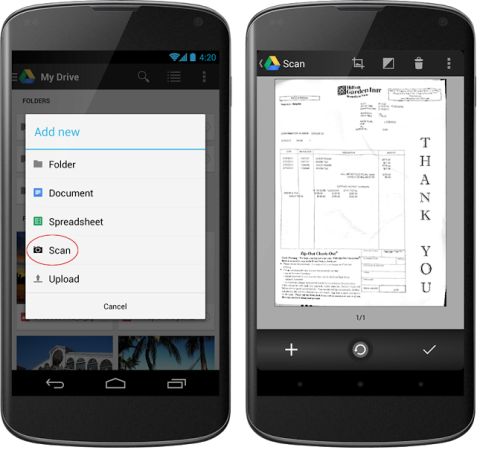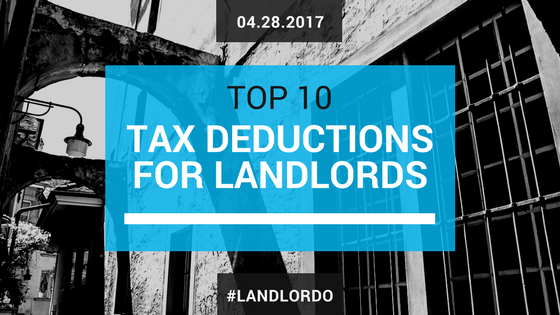Being a landlord is one of the best wealth creation strategies ever. Not only because of the passive cash flow it can generate, but also because of the many tax deductions a landlord can take.
In this article, we explain the top 10 tax deductions for landlords within the United States.
With that said, we are not tax accountants or real estate attorneys. It is always wise to speak with your local tax accountant who is up to speed on all of the new tax codes.
Tax Deductions for Landlords
It is extremely important to keep receipts and records of all of your expenses and costs associated with anything you are going to deduct. If you fail to have proper receipts and get audited, you will have to pay the amount due with interest.
A quick and easy way to digitize your receipts and invoices is to use Google Drive on Your Phone. You simply take a picture of the receipt and it will scan it for you and put it into a dedicated property tax folder. You can search for it at a later date based on the keywords within the receipt.

Now that we have an organized way to digitize our receipts and invoices, lets take a look at the top deductions for landlords.
-
Loan Interest Payments
- Most likely you will have a mortgage on your rental property. If so, this will probably be your single largest deductible expense.
- You may deduct mortgage interest payments made to banks for the acquisition and improvements being made for rental properties.
- You may not deduct any of the principle.
- You may not deduct interest payments on loans where the money is still in the bank. For example, a Home Line of Credit that you might be paying interest on but have not used the money yet.
- If you have a HELOC loan and use the money from something other than the rental property, you cannot deduct this interest from this second loan.
-
Taxes
- Usually your mortgage bank will automatically take out the taxes for you and send the total taxes you paid for the year within the form 1098.
-
Depreciation of Assets
- The depreciation of the asset is an accounting method of allocating the cost of a tangible asset over its useful life.
-
- Accelerated Cost Recovery System–(ACRS) for property placed in service after 1980 but before 1987.
- Straight line or declining balance method over the useful life of property placed in service before 1981.Generally, you must use the Modified Accelerated Cost Recovery System (MACRS) to depreciate residential rental property placed in service after 1986.
-
Repairs
- It is guaranteed that at least something will break within your rental property. The most commons things to break are AC/Heating, washing machines, garbage disposals, and toilets. It is important to separate what a repair is compared to an improvement. The cost of the repair can be deducted in a single year while the improvement has to be depreciated over many years. Repairs are defined as anything you do to maintain the current condition of a property or asset.
-
Maintenance
- With maintenance, don’t confuse this with repairing the property. Technically, they are two different things. Some examples of maintaining the property are:
- Lawn Care
- HOA Fees
- HVAC Filter Replacement
- Smoke and Carbon Monoxide Detector Battery Replacements
- Lightbulbs
- Pool / Spa Maintenance
- With maintenance, don’t confuse this with repairing the property. Technically, they are two different things. Some examples of maintaining the property are:
-
Fees
- There my be some years where you have more fees than others. Maybe you had to evict a tenant and used a third party law firm to help you with the process. Maybe you no longer want to manage yourself and decide to leverage a property manager. There are a variety of fees that you may have to decide to pay during the life of the rental.
- HOA Fees
- Property Management Fees
- Legal and Professional Fees
- House Cleaning Fees
- There my be some years where you have more fees than others. Maybe you had to evict a tenant and used a third party law firm to help you with the process. Maybe you no longer want to manage yourself and decide to leverage a property manager. There are a variety of fees that you may have to decide to pay during the life of the rental.
-
Insurance Premiums
- Insurance is another cost you absolutely must have. And since all business related insurance are tax deductible, you get the added benefit of writing it off.
- If you own multiple properties, you might think about getting an umbrella policy which protect all of your properties if something were to happen in one of them.
- Other potential insurance products you could think about getting are:
- Homeowners Insurance
- Fire/Damage/Liability Insurance
- Flood Insurance Riders
- Theft Insurance
- General Liability Insurance
- Personal Umbrella Insurance
- Insurance is another cost you absolutely must have. And since all business related insurance are tax deductible, you get the added benefit of writing it off.
-
Marketing
- Rental Marketing will most likely cost you less than $100 per month to post your rental properties online and purchase a yard sign. In high vacancy times, it may take 60 + days to get the property rented but during low vacancy times, you can rent out your property in less than 30 days.
-
Office and Operating Expenses
- Like any business, you need to properly run it with the appropriate tools and space. Some landlords work out of their home or even a commercial space. With that said, a home office deduction is one of the most commonly flagged deductions by the IRS. There are other things related to your landlord business that you can deduct as well including:
- phone bills
- internet access
- rental software
- paper, pins, etc.
- Like any business, you need to properly run it with the appropriate tools and space. Some landlords work out of their home or even a commercial space. With that said, a home office deduction is one of the most commonly flagged deductions by the IRS. There are other things related to your landlord business that you can deduct as well including:
-
Property Travel Expenses
- Most landlords may live away from their rental properties but it is essential to travel to them occasionally to check on property, do repairs, etc. You are able to deduct:
- Miles to and from the properties
- Airline Tickets when traveling to properties for business purposes
- Hotel when traveling for business purposes
- 50% of food while traveling to your properties
- Most landlords may live away from their rental properties but it is essential to travel to them occasionally to check on property, do repairs, etc. You are able to deduct:




















